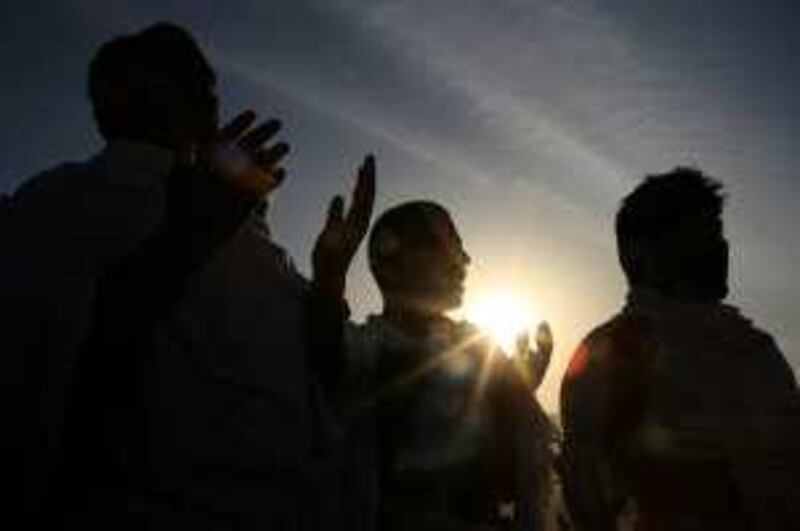Abu Dhabi // Prohibiting the elderly, small children and adults with chronic health problems from going to Mecca for pilgrimage is permitted under Islamic law, according to the General Authority for Islamic Affairs and Endowments, which organises and controls the UAE's Haj and Umrah affairs. The statement came after the Saudi Ministry of Haj issued a directive last week in Cairo asking Arab countries not to give Haj permits to those most at risk of swine flu.
The rare move has raised opposition among influential clerics in the kingdom. But according to a statement released yesterday by the UAE authority, the call is within the teachings of Islamic law. The body has sided with the UAE Ministry of Health and the Ministry of Interior. "The General Authority for Islamic Affairs and Endowments reiterates that the call to keep away the elderly and the sick from Haj to protect them from swine flu is in accordance with Islamic law," said Mohammed al Mazrouei, the executive director at the authority. "And this is to protect the health of pilgrims."
Haj is one of the five pillars of Islam and is required of each Muslim once in a lifetime. For many pilgrims, illness or the threat of dying while on pilgrimage is not a dissuading factor, as it is a sign of piety to do Haj in spite of all difficulties. During a typical Haj season, many elderly Muslims attend after having saved for years to make the important journey. This year Haj season begins in late November, when the seasonal threat of swine flu might be at its highest.
Mr al Mazrouei added that the rationale behind the statement was that Islam required the Haj only from Muslims who were able. "The legal requirement for performing Haj is the ability to do so," Mr al Mazrouei said. "The Ministry of Health received instructions from the Ministry of Haj in Saudi Arabia requesting a stop to Haj and Umrah permits issued to the elderly, defined as those over 65 years of age. This request is within what is permissible in Islamic Shariah."
He added that children are not required to perform Haj, and therefore "preventing them from doing so does not contradict Islamic law". The authority also is planning an awareness campaign for pilgrims and tour operators, who must provide a doctor and nurse. "We are focusing on raising awareness among pilgrims and tour operators by following prevention procedures, especially when crowds will be at their highest in number during the Haj," said Sheikh Taleb al Shehi, the head of religious advisory at the authority.
This year, 6,628 pilgrims will go to Mecca from the UAE, in accordance with the country's quota issued by Saudi Arabia. Pilgrims can find more information by contacting the authority at 800 2422 or visiting www.awqaf.ae relass@thenational.ae






